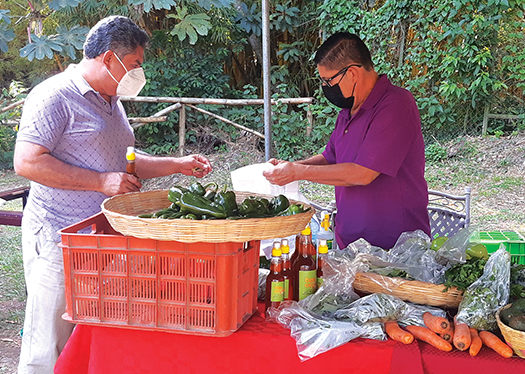
Grower Mario Cortez sells organically produced goods including chiles, carrots and honey at Alma Verde’s ecomarket in San Salvador’s Bicentennial Park. (Photo by Gerardo Arbaiza)
A Salvadoran network of eco-minded produce growers had to close its main market temporarily due to the pandemic, but it is back in operation and being touted by supporters as a promising response to the socio-economic dislocations brought on by the crisis.
Known as Alma Verde, or Green Soul, the network dates from 2018. It includes approximately 100 producers of everything from fruits and vegetables to herbs, ornamental plants and jams made from native plants such as jocote (Spondias purpurea), a tropical fruit whose name in indigenous Nahuatl, xocolt, means “acid fruit.” The network’s main sales outlet is a twice-monthly “ecomarket” organized under tents in Bicentennial Park, a 91-hectare (225-acre) urban park located in a protected forest administered by the city of San Salvador.
The event resembles a farmer’s market in appearance, but Alma Verde differs in important respects, says co-founder Beatriz Cuenca, a Salvadoran with U.S. citizenship and a former United Nations official. That, she says, is because its grower membership is built on a shared commitment to environmentally friendly products and processes, and on joint networking to promote that vision.
Homegrown beginnings
Cuenca decided 15 years ago with her husband, Mario Cortez, to grow their own food as a means of improving their family’s health, and began selling surplus carrots, potatoes, radishes and cabbages to friends and acquaintances. In 2018, she spearheaded the formation of a network of other Salvadoran growers and the creation of the Bicentennial Park ecomarket.
In doing so, Cuenca drew on her experience in procurement and logistics for a Salvadoran bottling company and subsequently for the UN Development Programme. She also brought to bear observations of organic markets in a previous chapter of her life, when she lived in the United States and earned a civil engineering degree at the University of Miami.
Alma Verde members are expected to ensure high quality, fair prices and organic production, though there is no formal certification. Its scale and popularity grew until the Covid-19 pandemic prompted the city of San Salvador to close Bicentennial Park last March, depriving Alma Verde of its main sales outlet.
Rather than quashing the nascent network, however, the pandemic prompted Cuenca and other members to add goods that catered to people’s new social and public-health needs. So when Bicentennial Park was reopened in mid-September, Alma Verde vendors offered more products such as turmeric, ginger and tilia, which are said to have anti-viral properties. Visitor traffic at the market has grown beyond pre-pandemic levels, she says, and new avenues of distribution have opened up as delivery services begun during the lockdown period have continued to operate. “The pandemic empowered us,” says Cuenca, who also serves as an advisor to El Salvador’s Education Ministry.
Now back to a schedule of selling in the park on two Sundays every month, Alma Verde vendors offer products grown in their home gardens or on plots using green-friendly inputs. The network has faced challenges ranging from a sales-tent shortage to the rents charged by the municipality for space at the ecomarket. And while participating growers now exceed 100, only 30 to 35 of them can be accommodated at a time in the Bicentennial Park market due to Covid-19 distancing restrictions.
Educational dimension
Not all Alma Verde members are growers. El Salvador Zoological Foundation (Funzel), a 28-year-old Salvadoran conservation nonprofit, joined the network to help promote the initiative and provides environmental education programming at the ecomarket. “All the Alma Verde vendors share our values,” says Alejandra Cabezas, Funzel’s communications coordinator “All have an ecological mindset.”
Beatriz Cuenca says ecomarkets have also formed elsewhere in the country, some involving the participation of Alma Verde members. The new markets, which currently number six, are proof that the model has promise, she says.
Indeed, some environmental advocates argue green businesses represent a potentially strong response to socio-economic disruption brought on by the pandemic. A key ingredient is entrepreneurs capable of creating “added value for their community” while benefiting their bottom line, says agronomist Boris Castillo, project coordinator for a nonprofit Central American network of civil society groups concerned with climate friendly development.
Castillo says his organization, the Regional Network for Risk Management (CRGR), favors approaches which, like Alma Verde’s, point toward an “ecologically sustainable small-scale economy.” Such approaches, he adds, could be especially useful now. “Covid 19…has caused social change and we must adapt,” says Castillo, who argues that if Salvadorans grow food on their unused property they can offset shortages brought on by the pandemic and feed people unable to find work. And farmers, he adds, “should learn to tap what they can in their communities so they don’t have to buy transgenic seeds or chemical fertilizers.”
- Gerardo Arbaiza